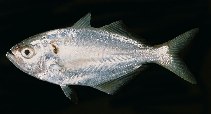| Family: |
Lactariidae (False trevallies) |
| Max. size: |
40 cm TL (male/unsexed) |
| Environment: |
pelagic-neritic; brackish; marine; depth range 15 - 100 m |
| Distribution: |
Indo-West Pacific: East Africa (Ref. 2871, 5213, 30573) to Southeast Asia, north to Japan, south to Queensland, Australia. Reported from Fiji (Ref. 12743). |
| Diagnosis: |
Dorsal spines (total): 8-9; Dorsal soft rays (total): 20-22; Anal spines: 3-3; Anal soft rays: 25-28. Silvery grey with blue iridescence dorsally, silvery white ventrally; upper part of gill cover with a dusky black spot; fins pale yellow. Mouth large and oblique. |
| Biology: |
Found in coastal waters down to a depth of about 100 m (Ref. 30573) and between 15-90 m in western Indonesia (Ref. 12260). Feeds on sand-dwelling animals (Ref. 5213). Marketed fresh and dried salted. |
| IUCN Red List Status: |
Not Evaluated (N.E.) Ref. (130435)
|
| Threat to humans: |
harmless |
Source and more info: www.fishbase.org. For personal, classroom, and other internal use only. Not for publication.
